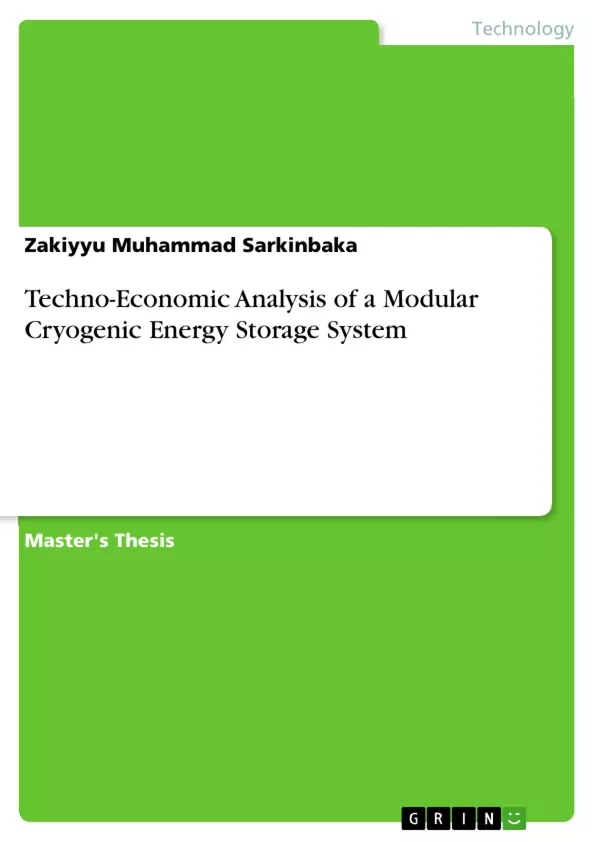Sustaining economic growth while reducing reliance on fossil fuels for environmental protection is a global challenge. Efforts are made to decrease energy utilization by enhancing energy efficiency and discovering clean, renewable energy sources. Cryogenic energy storage (CES) is a grid-scale energy system where electricity is stored in the form of liquefied air. It is regarded as a solution because it allows for increased electricity generation while also providing economic benefits by avoiding costly operational consequences. The three CES system configurations: standalone adiabatic, waste heat integration, and combustion integration were modelled and simulated in Aspen HYSY V8.8. Unlike in the conventional CES, Dowtherm-Q was used as the thermal fluid due to its thermal stability, non-corrosiveness, and high temperature resistance.
The results indicated that the higher the adiabatic efficiency of the turbine, the greater the power generated; also, increasing the turbine inlet temperature enhanced the performance of the system configuration by lowering the pressure and increasing the power of the turbine. The economic analysis revealed that the waste heat-based system has both the lowest operating cost, capital cost, utility cost, and higher energy savings. Waste heat integration produces the most power (653.70 KW) and saves the most energy (69.58%), with lower capital costs, operating costs, and utility costs due to the increased adiabatic efficiency of the turbine. It implies that CES with waste heat integration is economically more promising compared to adiabatic standalone and the integration of combustion.
Inhaltsverzeichnis (Table of Contents)
- ABSTRACT
- DEDICATION
- ACKNOWLEDGEMENT
- TABLE OF CONTENTS
- LIST OF FIGURES
- NOMENCLATURE and ABBREVIATION
- CHAPTER ONE
- INTRODUCTION
- 1.0 Background
- 1.2 Aim and Objectives of the Study
- 1.3 Significance of the Study
- 1.4 Scope of Study
- 1.5 Limitation
- CHAPTER TWO
- LITERATURE REVIEW
- 2.1 Liquid Air Energy Storage Generation, Storage and Utilization
- 2.2 Developments in cryogenic energy storage
- 2.3 Configurations of Adiabatic cryogenic energy storage systems
- 2.3.1. Principle of operation of a CES system
- 2.3.2. System Design and Operational Parameters
- 2.4 Charging Processes of a CES
- 2.4.1 Liquefaction process
- 2.4.2 Cold Storage Configurations assessed in the context of CES
- 2.5 Discharging Processes Configurations assessed in the context of CES
- 2.6 System integration
- 2.7 Classification, characteristics and benchmarking of Energy Storage technologies
- 2.7.2 Characteristics of Energy Storage technologies
- 2.8 Sensitivity Analysis of CES system
- 2.9 Economic analysis of CES system
- 2.9.1 Capital Expenditures (CAPEX)
Zielsetzung und Themenschwerpunkte (Objectives and Key Themes)
This dissertation focuses on the techno-economic analysis of a modular cryogenic energy storage (CES) system. The study aims to explore the potential of CES as a grid-scale energy storage solution, considering its ability to enhance electricity generation and provide economic benefits. The analysis incorporates various system configurations and assesses their performance based on factors like adiabatic efficiency, turbine inlet temperature, and operational costs.
- Analysis of various CES system configurations (standalone adiabatic, waste heat integration, and combustion integration)
- Evaluation of the impact of adiabatic efficiency and turbine inlet temperature on system performance
- Comparative economic analysis of the different CES configurations
- Assessment of the potential for energy savings and cost reduction through waste heat integration
- Exploration of CES as a solution for sustainable energy storage and grid stability
Zusammenfassung der Kapitel (Chapter Summaries)
Chapter One provides an introduction to the research topic, outlining the background, objectives, significance, scope, and limitations of the study. It highlights the importance of sustainable energy storage solutions and the potential of CES in addressing global challenges. Chapter Two presents a comprehensive review of relevant literature on cryogenic energy storage. The chapter explores the principles of CES operation, different system configurations, charging and discharging processes, economic analysis, and the advantages and disadvantages of CES compared to other energy storage technologies. This chapter lays the foundation for the research by providing a detailed understanding of existing knowledge and current trends in the field.
Schlüsselwörter (Keywords)
The key focus of this dissertation is on cryogenic energy storage, particularly the techno-economic analysis of various system configurations. The research employs computational modeling and simulation techniques to assess the performance and economic viability of CES. Key themes include energy storage, sustainability, energy efficiency, grid stability, waste heat integration, capital expenditures, operating costs, and economic optimization.
- Arbeit zitieren
- Zakiyyu Muhammad Sarkinbaka (Autor:in), 2024, Techno-Economic Analysis of a Modular Cryogenic Energy Storage System, München, GRIN Verlag, https://www.grin.com/document/1465891



